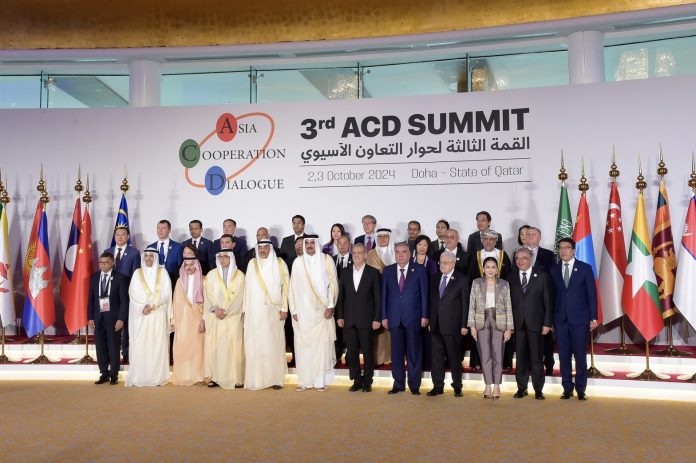Prime Minister Paetongtarn Shinawatra has come under scrutiny after using an iPad to read her speech during the 3rd Asia Cooperation Dialogue (ACD) held in Doha, Qatar, last week. The move sparked criticism online, with some netizens likening her to a schoolchild and expressing that it was an embarrassment for Thailand. The backlash came despite the event marking her debut on the global stage as Thailand’s youngest prime minister at 38 years old.
The controversy unfolded shortly after Paetongtarn celebrated her inclusion in the TIME100 Next list of influential leaders shaping the future. She expressed her surprise and gratitude for the recognition, stating she was honored to be named. However, following the ACD summit, where she represented Thailand, the government announced on October 4 that her first participation in an international forum was deemed a success, with numerous countries offering their praise.
During the conference, Paetongtarn met with leaders from several nations who acknowledged Thailand’s key role in founding the ACD two decades ago. She mentioned that many countries congratulated Thailand for its upcoming chairmanship of the ACD in 2025 and showed interest in investing in the country. “Thailand will fully commit to its role as chair, and I was able to hold meaningful conversations with multiple leaders about potential investments,” she stated.
While the government lauded her international engagement, former Prime Minister Srettha Thavisin took to Twitter to commend Paetongtarn for her participation and meetings with four national leaders. He highlighted her role as the only woman in attendance, positioning Thailand as a nation equal to others on the global stage.
Despite this praise, critics focused on her reliance on an iPad during the speech, an act that sparked memories of similar mockery directed at her aunt, former Prime Minister Yingluck Shinawatra. The debate spread rapidly on social media, with opponents of the Shinawatra family using the incident to question her leadership abilities. Supporters of Paetongtarn and the Pheu Thai Party, however, argued that the criticism stemmed from political bias and deep-seated animosity towards the Shinawatras.
In response to the online backlash, Paetongtarn addressed one critic directly, explaining that she opted for an iPad to ensure accuracy, as some of the technical terminology related to international relations was new to her. The notes, she clarified, were provided by the Foreign Ministry. When asked by reporters on October 7 whether the incident raised doubts about her leadership, she reiterated that her priority was the content and accuracy of her statements, not the medium through which they were delivered. “iPads are used globally, and whether one chooses to use paper or a tablet, the focus should be on delivering the message effectively,” she said.
She added that public reaction is part of the job, and while negative feedback can be disheartening, it is important to move forward and continue focusing on policy goals. “As Prime Minister, I am also human. Positive feedback is motivating, but we can’t be discouraged by negativity. We have a duty to advance our policies and get things done,” she concluded.
Deputy Prime Minister Phumtham Wechayachai, who serves as a mentor to Paetongtarn, also weighed in, urging critics to focus on her work rather than on superficial aspects. He dismissed comments about her appearance and voice as irrelevant, emphasizing the importance of substance over style in leadership. Phumtham further reflected on the divisive nature of Thai politics, calling for a greater understanding of political differences and cautioning against a growing trend of intolerance.
Phumtham also referenced the October 6, 1976, incident, drawing parallels to the current political climate. He urged society to learn from the violence of the past and focus on addressing political differences constructively. He warned that, while there may not be physical violence now, the intense polarization and desire to defeat opposing views have contributed to deepening divisions in Thai society.
As Paetongtarn navigates her early days in office, the balancing act between public perception and leadership effectiveness remains a key challenge. Whether this latest controversy will have lasting effects on her administration remains to be seen, but her focus appears firmly set on Thailand’s upcoming role in international diplomacy.



